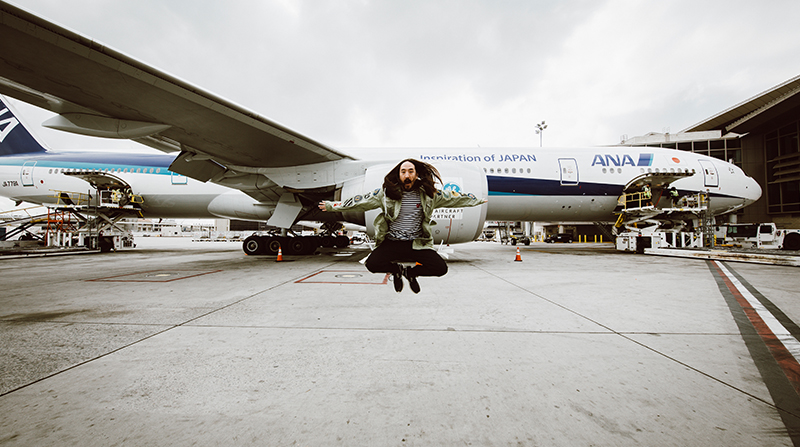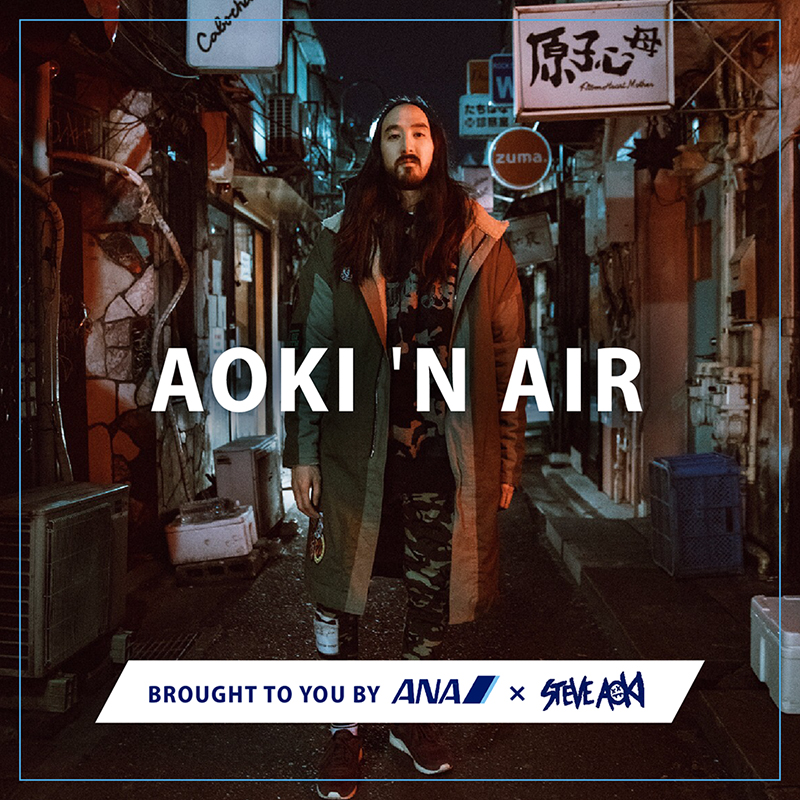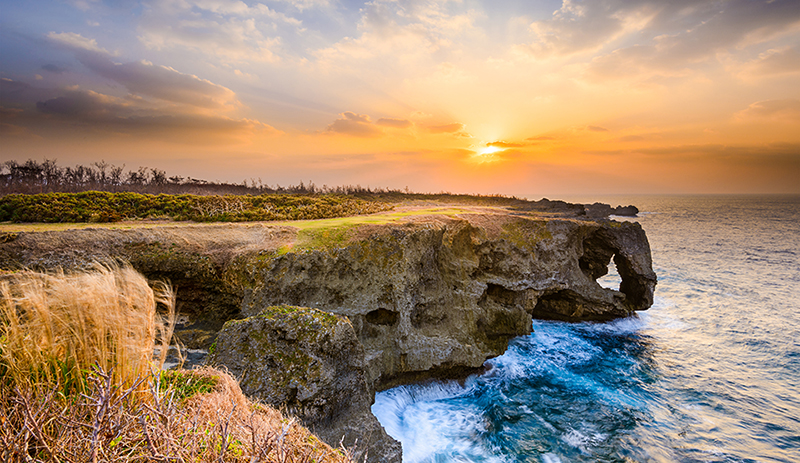

As the world’s most-traveled DJ (even holding a Guinness World Record to prove it), superstar Steve Aoki logs more than 260 days a year on the road. He journeys everywhere from Argentina to Australia, but the one destination he always yearns to return to is Japan.
Growing up, Aoki frequently visited the country with his Japanese parents (his father founded the Benihana restaurant chain). And as an adult, he continues to find new reasons to spend time there. He shares his insights on Aoki ’N Air, his new travel podcast with All Nippon Airways dedicated to Japanese culture. “Let’s get people to experience how amazing this culture is,” he told us.
We talked to the Grammy-nominated artist about his love of Japan, and he gave us the lowdown on where to eat in Tokyo, the local bands worth seeking out and the most Instagrammable place you’ll ever see.
Why is Japan so special to you?
My heritage is everything to me. Whether I like it or not, it informs everything I do. The culture, the history, the things that connect me already: the music, art, fashion and food. Whenever I go to Japan, I get even more and more inspired to learn more about where I come from.
For one, of course, it’s very important that this is who I am, and I want to know more about my culture, but when you go there just as a human being, I think anyone can feel the same way. When you see Japan for at least a few days, you really get this different kind of experience than any other country can offer. And mainly in the hospitality. I think the hospitality — the way people treat each other — is just a beautiful thing.
[After you spend time among the Japanese], you go back to wherever you come from, and you start treating people with more respect, patience and understanding.

What are your favorite cities to visit in Japan?
My No. 1 favorite city in the world is Tokyo. Tokyo has all those things I talk about in Aoki ’N Air, so you have to check out the podcast so you can get the details there, but to make it a little bit brief for this interview, you get all kinds of Japanese cuisines in Tokyo.
You get Harajuku, where you really can dive into these alleyways and find a bunch of fashion and the culture of fashion there. And the music scene in Tokyo is booming, whether it’s J-pop — Japan’s version of pop music, which is very interesting in itself — or even Japanese hip-hop or Japanese rock. One of my favorite bands is ONE OK ROCK, and they’ll definitely be playing tons of shows in Tokyo.
Every time I come to Japan, I always find myself in Tokyo. I spend most of my time there, and then I’ll tour and play other cities.
I do love Osaka. Osaka would be my No. 2. Kyoto would be my No. 3 because you get the temple life and a whole different side of Japan. You get more onsen, which are the Japanese bathhouses. It is a very important thing to do when you’re in Japan, to experience something like that, but I’m going to give it to Tokyo.
What do you like about the Japanese art and fashion?
Japan has been on the cutting edge of museums and galleries. There’s one in particular that I went to last time I was in Japan that everyone needs to check out, [teamLab Borderless]. I think they’ve clocked in over a million people who have come to this gallery. It’s more of a virtual reality/augmented reality/fantasy theme park, and it was anonymously created by, I think, over 100 artists that came together to build out these rooms that you’ve never experienced in your life.
It’s this huge complex, and whether they use lights or colors or images or a combination of images and 3D structures, you’re mesmerized. You’re really hypnotized in these spaces. It’s the most Instagrammable place you can go possibly go to. Everyone’s pulling out their phones and taking pictures of themselves in these environments because you’ll never get that anywhere else. It’s perfect for a music video shoot. We tried to shoot something in there, but it was a bit hard because there was a bunch of people there as well.
And I’ll give a shoutout to Harajuku because that’s where you want to go if you want to discover new kinds of fashion. You will just walk down those alleyways and pop your head into these stores and you will find some really bizarre, really weird, really cool stuff and pretty normal stuff, too, with that flair you might be looking for because you’re in Japan and you want to get something different. But I go there for inspiration for fashion.
What is the music scene like in Japan?
There’s the J-pop scene, which is incredibly interesting, but for me when I think about the music scene, I think about it as far as my shows.
I talk to my friends a lot about this, how incredible the fans are in Japan. They are passionate and energetic, but totally in control. When the song’s done or the music’s done, everyone’s silent. Everyone’s waiting to hear what you have to say. And then you drop a song or a banger and people go crazy. It’s just this level of respect. They’re totally with you.
They are true music fans. They define the best fans in the world because they’re respectful and they get your music and they’re educated, and they follow that, and it just makes me love playing in Japan.
Now, the Japanese music scene is also very exciting. Just the domestic scene is so big, and you can only hear it in Japan. When you want that exclusive kind of sound and culture and you want something completely different from what you would hear in your country, go to Japan and tap into the Japanese music scene.
Kyary Pamyu Pamyu and BABYMETAL are two I would say to check out.
What should be on a traveler’s Tokyo itinerary?
I think some of the things people need to check out are Golden Gai, because it’s a bar scene like you’ve never seen in your life; the Ginza district; the Harajuku fashion district; and the Senso-ji temple to feel a little bit of that culture. You really feel it and you smell it because you get the incense burning and all that good stuff.
Akihabara, which is the seven-story malls for arcade games. Shibuya. The list goes on. Roppongi is a lot of fun, too.
What are some must-have foods when visiting the city?
I highly recommend ramen and yakitori. Yakitori is my favorite. You’ll get the best chicken skewers in the world in Japan. Yakitori chefs train their whole life, and they are literally the best at what they do.
My favorite ramen spots are Afuri and Ippudo. It’s all about the broth — it’s such a big deal in ramen culture. Each ramen house makes their own broth differently. As far as the yakitori spot, go to Toriyoshi. Toriyoshi is the bomb.
If you want to eat super local, I would go for senbei. It’s like rice crackers. And my favorite is natto. Natto is this fermented soy beans you put on rice. You might not want to try it, you might want to try it, but I love it. It’s definitely an acquired taste.
What are your favorite Tokyo hotels?
I have to give it to Grand Hyatt. Grand Hyatt is awesome. I always end up staying there. Great service. Amazing bed. Great shower. All the foundations of what makes a hotel amazing are there. And it’s located right in Roppongi, not too far from Harajuku and Shibuya, and you can walk around that area. There’s tons of stuff to see and do and tons of great food options, so I definitely recommend Grand Hyatt.

Which Japanese cities do you want to visit next?
I definitely want to go to Okinawa. It feels like the Hawaii of Japan. I’ve never been, and I’d love to play a show there, so I’m kind of waiting for a promoter to bring me down there. But if not, I will make my way there.
From what I understand, they have really good scuba diving. I would love to check that out. It’s also known that people from Okinawa live the longest [Editor’s note: it’s reported that Okinawa has the highest rates of centenarians in the world]. I want to know what they’re eating and try some of their food.
Being on the road for 260 days of the year is rigorous. What travel tips do you have for staying sane and healthy?
When you’re on the road like this, you have to have fun, you have to find time to work out and you have to make sure you’re getting in the right foods. So eat healthy and work your body. Work your muscles. Work your brain. And also sleep.
I know I did a documentary called I’ll Sleep When I’m Dead, but I’m learning more and more how important sleep is for me to continue going at the pace I’m going. It’s a mix of all those things. Add in some meditation and some yoga and that’s always going to really help you.
Flying with ANA is a great fit for me because the airline does combine this healthy Japanese cuisine that I want and look for with amazing amenities to keep you fresh and rested while you travel, so right when you get off the plane you got your sleep in and you got your good food in and you can hit the day hard.
Tell us about your new comic book Neon Future.
I’m so excited for my comic book. I’m getting a lot of feedback from fans on social media, so I’m so happy it’s out there and people are reading it and loving it. It’s been such a fun project developing the story and visuals because Neon Future originally was a musical project. It was my first way to express what Neon Future means, but it really deserved a visual component, and my goal was to make a comic book out of it. And we did it so exceptionally well.
